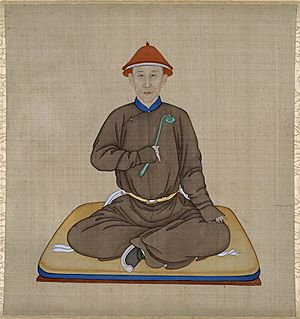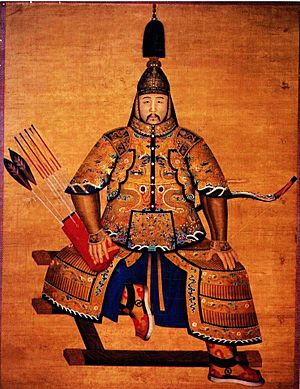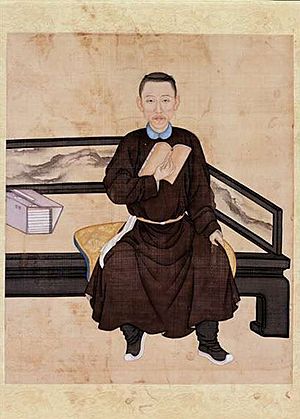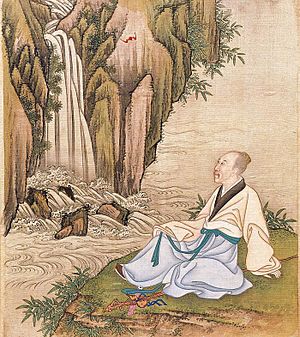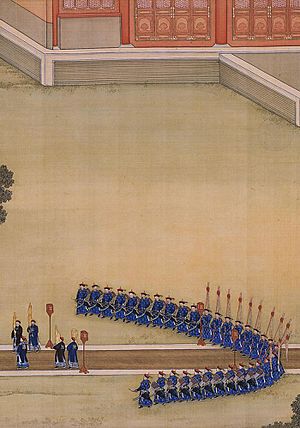Yongzheng Emperor facts for kids
Quick facts for kids Yongzheng Emperor雍正帝 |
|||||||||||||||||
|---|---|---|---|---|---|---|---|---|---|---|---|---|---|---|---|---|---|
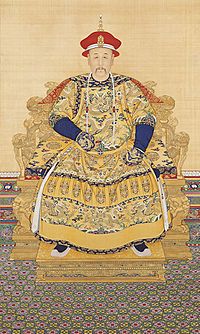
Portrait in the Hong Kong Palace Museum
|
|||||||||||||||||
| Emperor of the Qing dynasty | |||||||||||||||||
| Reign | 27 December 1722 – 9 October 1735 | ||||||||||||||||
| Predecessor | Kangxi Emperor | ||||||||||||||||
| Successor | Qianlong Emperor | ||||||||||||||||
| Prince Yong of the First Rank (雍親王) |
|||||||||||||||||
| Reign | 1709–1722 | ||||||||||||||||
| Born | Aisin Gioro Yinzhen (愛新覺羅·胤禛) 13 December 1678 (康熙十七年 十月 三十日) Yonghe Palace, Forbidden City |
||||||||||||||||
| Died | 8 October 1735 (aged 56) (雍正十三年 八月 二十三日) Jiuzhou Qingyan Hall, Old Summer Palace |
||||||||||||||||
| Burial | Tai Mausoleum, Western Qing tombs | ||||||||||||||||
| Spouse |
Empress Xiaojingxian
(m. 1691; died 1731) |
||||||||||||||||
| Issue | Hongshi Hongli, Qianlong Emperor Hongzhou, Prince Hegong of the First Rank Hongyan, Prince Guogong of the Second Rank Princess Huaike of the Second Rank |
||||||||||||||||
|
|||||||||||||||||
| House | Aisin Gioro | ||||||||||||||||
| Dynasty | Qing | ||||||||||||||||
| Father | Kangxi Emperor | ||||||||||||||||
| Mother | Empress Xiaogongren | ||||||||||||||||
| Religion | Tibetan Buddhism | ||||||||||||||||
| Yongzheng Emperor | |||||||||||
|---|---|---|---|---|---|---|---|---|---|---|---|
| Traditional Chinese | 雍正帝 | ||||||||||
| Simplified Chinese | 雍正帝 | ||||||||||
|
|||||||||||
The Yongzheng Emperor (born Yinzhen, 13 December 1678 – 8 October 1735) was the fourth emperor of the Qing dynasty. He was also known by his temple name, Emperor Shizong of Qing. He ruled from 1722 to 1735. Yongzheng was a very hard-working ruler. His main goal was to make the government work well and save money. Like his father, the Kangxi Emperor, he used military power to keep the dynasty strong.
Even though Yongzheng's rule was shorter than his father's and his son's, it was a time of peace and wealth. He fought against corruption and improved how the government managed people and money. During his reign, the Grand Council was formed. This group had a huge impact on the future of the Qing dynasty.
Contents
Early Life and Becoming a Prince
Yinzhen was the Kangxi Emperor's eleventh son. He was the fourth son to live to adulthood. His mother was a court attendant from the Manchu Uya clan. When Yinzhen was born, his mother had a low rank and could not raise her own children.
For most of his childhood, Yinzhen was raised by Noble Consort Tong. She was the daughter of a powerful official. She died when Yinzhen was only nine years old. Yinzhen's own mother was later promoted to a higher rank. She became known as "Virtuous Consort."
The Kangxi Emperor made sure his sons, including Yinzhen, had a good education. He also let them see the world outside the palace. Yinzhen went with his father on several trips. He also became a leader in the Plain Red Banner during a battle against the Mongol Dzungar Khanate. In 1689, Yinzhen became a beile, a noble title. He was promoted to a second-rank prince in 1698.
In 1709, the Kangxi Emperor removed his second son, Yinreng, as crown prince. This opened the way for other sons to compete for the position. In the same year, Yinzhen was promoted to a first-rank prince. He was given the title "Prince Yong of the First Rank."
Yinzhen kept a low profile during the fight for the throne. He did not openly seek the position. The Kangxi Emperor asked his court officials to suggest a new crown prince. Many preferred the Kangxi Emperor's eighth son, Yinsi. However, the Kangxi Emperor did not choose Yinsi. He worried that Yinsi was becoming too powerful.
Yinzhen then supported Yinreng, hoping his father would make him crown prince again. This earned him his father's trust.
Yongzheng's Beliefs and Reforms
Yinzhen was very familiar with Confucianism. He often led important ceremonies for his father. He also took part in political discussions, which helped him develop strong diplomatic skills.
As the Yongzheng Emperor, he was a very diplomatic ruler. He wanted to create a "moral government" based on Confucian ideas. He looked for four qualities in his officials: loyalty, fairness, sincerity, and ability. He believed these qualities would help him run the government well and keep the empire stable.
After becoming emperor in 1723, Yongzheng worked hard to fix the government. He wanted to make the Qing Empire unified and peaceful. In 1733, he successfully created the Grand Council. This group helped the empire communicate quickly and effectively. It also helped him carry out his new policies.
With the Grand Council, Yongzheng was able to fight corruption. He also started many reforms that helped the empire and its people. He rebuilt canals and irrigation systems to support farming. During times of famine, he sent help and resources to affected areas. He also issued a decree to free slaves under his rule.
One of his tax reforms changed how people paid taxes. Instead of a head tax (tax per person), he shifted it to a property tax on landowners. This greatly reduced the tax burden on ordinary people. Yongzheng also supported building orphanages for children and poorhouses for those in need.
His reign may not be as famous as his father's or son's. However, the Yongzheng era brought peace and prosperity to Qing China.
The Struggle for the Crown Prince's Position
In 1712, the Kangxi Emperor removed Yinreng as crown prince again. He did not name a new heir for the rest of his reign. This led to a tough competition among his sons. Yinzhi, Yinsi, and Yinti were seen as the main contenders. Yinsi had a lot of support from officials, but not from his father.
Yinzhen had supported Yinreng. He did not build a large group of supporters until the last years of his father's reign. Unlike Yinsi, Yinzhen worked quietly. When the Kangxi Emperor died in December 1722, only three princes were left in the race.
At the time of his father's death, Yinti was leading a military campaign far away. Some believed Yinti would be chosen as the next emperor. However, some historians believe Kangxi sent Yinti away to protect Yinzhen, his secret choice. This also kept Yinti from joining forces with Yinsi.
There were signs that Yinzhen was Kangxi's secret choice. Kangxi often spoke about how Yinzhen showed him respect. Also, Kangxi highly favored Yinzhen's son, Hongli (who would become the Qianlong Emperor). This might have influenced Kangxi's decision.
Official records say that on 20 December 1722, the Kangxi Emperor called seven of his sons and a general to his bedside. The general read the will, stating that Yinzhen would be the next emperor.
Yinzhen's Approach to Power
During the struggle for the throne, Yinzhen mostly stayed out of the spotlight. He focused on showing respect to his father and doing his duties well. He did not openly show ambition for the throne. He even asked his father to be kind to other princes. This earned him praise from the Kangxi Emperor.
Kangxi knew that Yinzhen's humility might not be entirely real. However, he still praised Yinzhen. In a time when his sons were fighting openly, Yinzhen's respectful behavior was a comfort to Kangxi. Kangxi hoped that Yinzhen would not mistreat his family in the future, which turned out to be mostly true.
Disputes Over Who Would Rule
Kangxi's plan for succession caused many arguments. It was not clear to everyone why Yinzhen was chosen. He was not the oldest or the most obviously talented. Kangxi had not publicly named an heir. His will was only read by a general after his death. There was no clear proof that the will was not changed.
Many other princes were shocked by Kangxi's choice. Yinzhen's rule faced strong opposition from princes like Yinti and Yinsi. Yongzheng spent much of his early reign dealing with these rivals.
A popular story says that Yinzhen became emperor by changing his father's will. One version says he changed the Chinese character for "ten" (十) to "at" (于). This would change "transfer the throne to the Fourteenth Prince" to "pass the throne on to the Fourth Prince." Another version says he changed "ten" (十) to "number" (第), making it "transfer the throne to the Fourth Prince."
However, researchers have shown this story is not true. Official Qing documents always listed a son's title and rank. Yinzhen was the "Fourth Son," and Yinti was the "Fourteenth Son." Changing the will would have been impossible without obvious signs. Also, the will was written in Chinese, Manchu, and Mongolian. Changing it in all three languages, especially with different writing systems, would have been extremely difficult.
Yongzheng's Reign as Emperor
After becoming emperor in December 1722, Yinzhen chose the era name "Yongzheng." This means "Harmonious Justice." He chose his new governing council right away. It included his brothers Yinsi and Yinxiang, and other important officials. Yinsi and Yinxiang were given high titles and positions.
Dealing with Other Princes
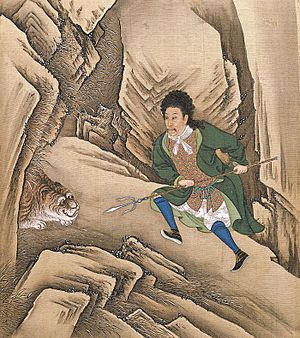
The way Yongzheng became emperor remained a topic of discussion. Many of his brothers did not think his rule was rightful. This made Yongzheng worried that they would try to overthrow him. His older brothers, Yinzhi and Yinreng, remained under house arrest. Yinreng died two years into Yongzheng's reign.
Yongzheng saw Yinsi and his allies as his biggest challenge. He used a "divide and conquer" plan. He gave Yinsi a high noble rank and an important government job. This kept Yinsi busy and under close watch. Yinsi's allies were treated differently. Some were sent far away, making it hard for them to conspire.
Yinti, Yongzheng's own brother, was called back from his military post. Yongzheng replaced him with a trusted general. Yinti was upset and did not want to accept Yongzheng as emperor. He was accused of bad behavior at their father's funeral and put under house arrest. Their mother was sad about the conflict between her sons. She died less than six months after the Kangxi Emperor.
Yongzheng publicly criticized Yinsi in 1724. He removed Yinsi from office and put him under house arrest. Yinsi was even forced to change his name to a derogatory Manchu word. Yongzheng also took away the wealth of Yintang and Yin'e.
Fighting Corruption and Improving Finances
The Kangxi Emperor's long rule had some problems, like a budget deficit and widespread corruption. Officials and nobles often borrowed money from the government and did not pay it back. Yongzheng immediately started to fight corruption and fix the financial problems.
He used his experience to predict how corrupt officials would try to hide their actions. Then, he created ways to stop them. He sent independent inspectors to check on local officials. If an official was found guilty, a new, honest person would take their place. He also made it illegal for local people to lend money to officials. This stopped officials from temporarily covering up their debts.
Yongzheng also created a special group to check all spending and income reports. This prevented local officers from bribing the Ministry of Revenue to fake financial records. He made it clear that "deficit spending" (spending more than you have) was not the same as corruption. Both would be investigated and punished.
To stop guilty officials from taking more money from the people, Yongzheng immediately removed them from their positions. This meant they had no power to exploit people further. Their own property and even their families' property could be taken to pay back the money. Yongzheng wanted corrupt officials and their families to "live in poverty and misery." Because of his strict punishments, he was sometimes called the "Emperor of confiscation."
Besides harsh punishments, Yongzheng also increased officials' salaries. He created a "Fund for transparency nurturing" from extra government money. This fund gave officials enough money so they would not need to take bribes. This also made their incomes public, helping the government spot any signs of corruption. All gifts and "ritual fees" were strictly forbidden.
The Secret Report System
To know what his officials were doing, Yongzheng used a "secret report" system. He chose trusted officials from all over the empire to be secret informants. These informants could privately report anything suspicious to the emperor. Their identities and reports were kept secret. This allowed the emperor to have a wide network of information without a special spy agency.
These secret reports were only for reference and had no legal power. This prevented informants from abusing their power. Yongzheng also gathered information from many sources to avoid false accusations. Accused people also had a chance to defend themselves. This system helped protect innocent officials from wrong charges.
Helping Farmers and Local Communities
With a growing population, there was a high demand for food. Yongzheng encouraged officials to buy land specifically for farming. He offered tax breaks for 5-10 years on this new farmland. This led to over a million new acres of farmable land. This helped provide more food for the people.
Yongzheng also tried to make the Civil Service Examinations more accessible. He set up special exams in rural areas. He also made it legal for certain groups, like the Hakka people, to take the exams. This helped reduce anger from people who felt excluded.
With the growing population, there were more orphaned children and poor families. Yongzheng ordered that orphanages (also called poor houses) be built in every county. These were funded by private donations, not by the government. They served as an example of how wealthy officials should help the poor.
Changes to Privileges
The Kangxi Emperor had allowed scholars who passed the Civil Service Examination to avoid some legal punishments. Instead, they would receive counseling. This led to corruption among officials. Yongzheng made it illegal to give special privileges to officials in the legal system. However, his son, the Qianlong Emperor, later brought these privileges back.
Yongzheng also removed special tax breaks for households with government officials. He saw these local powerful families as a threat to his rule. Like the legal privileges, these tax breaks were also brought back by the Qianlong Emperor after Yongzheng's death.
Religious Policies
In the early 1720s, Yongzheng became distrustful of Jesuit missionaries. He took steps to limit Christianity in China. His father had already banned foreign missions outside Beijing and Guangzhou. Yongzheng went further by removing all foreign priests from China. Christian churches were closed and used as public offices.
Yongzheng was strongly against Manchus converting to Christianity. He believed Manchus should follow their own traditional way of worshipping Heaven. He said that different peoples had their own ways of honoring Heaven, and Manchus should stick to theirs.
In 1724, Yongzheng officially banned Catholicism. This led to more persecution of Chinese Christians under his son, the Qianlong Emperor.
Ancestral worship was seen as a Chinese tradition, not just a religious ritual. However, the Catholic Church condemned Chinese rites. This led to missionaries being banished by Qianlong in 1742.
Military Expansion in the Northwest
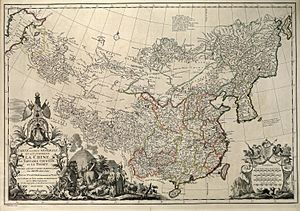
Like his father, Yongzheng used military force to protect the Qing Empire's power in Outer Mongolia. When Tibet had a civil war in 1727–1728, he sent troops to help. After they left, he kept a Qing official and soldiers there to protect the empire's interests.
For a campaign in Tibet, Yongzheng sent a large army against the Dzungars. This campaign cost a lot of money. Later, he sent a smaller army, but it was defeated. This put the Qing Empire at risk of losing control of Mongolia. However, a Khalkha ally of the Qing later defeated the Dzungars.
By 1730, the empire's income had greatly increased due to Yongzheng's reforms. However, defending the borders and keeping peace in areas like Qinghai were very expensive. Military spending used up a lot of the treasury's money. Because of these high costs, Yongzheng considered making peace with the Dzungars.
Qing Empire and China
Since the Shunzhi Emperor's time, Qing emperors saw China and the Qing Empire as the same. In official documents, the Qing Empire called itself "China." During Yongzheng's reign, "China" was used to mean the Qing Empire in official Manchu documents. This showed that the Qing Empire and China were one entity.
The Qing emperors redefined "China" to include many different ethnic groups and their lands. Yongzheng spoke out against rebels who claimed the Qing only ruled Manchus, not China. He said that being Manchu was like having a hometown in China. He argued that it did not lessen their virtue as rulers.
Religion and Culture
People across Qing China were very diverse. The Qing rulers respected local cultures and religions. They did not force people to adopt Manchu customs or beliefs. Each region was allowed to keep its own traditions and ways of worshipping.
However, Yongzheng strongly encouraged Manchu elites to keep their own ethnic identity and ways of worshipping Heaven. He said that Manchus had their own special rites for honoring Heaven, just as other groups did. He believed Manchus should follow their own traditions.
Death and Succession
The Yongzheng Emperor ruled for 13 years. He died suddenly in 1735 at age 56. A legend says he was killed by Lü Siniang, whose family was executed by the emperor. Another idea is that he died from poisoning. He was taking elixirs, hoping they would make him live longer.
To avoid a succession crisis like the one he faced, Yongzheng created a secret system for choosing the next emperor. He wrote his chosen successor's name on two scrolls. One scroll was put in a sealed box behind a stone tablet in the Qianqing Palace. He kept the other copy with him. After his death, officials would compare the two scrolls. If they matched, the person named would become the new emperor.
Yongzheng was buried in the Western Qing tombs, southwest of Beijing. His fourth son, Hongli, became the next emperor, known as the Qianlong Emperor. The Qianlong Emperor later restored honors to many people who had been punished during his father's reign. This included some of his uncles who were rivals for the throne.
Family Life
The Yongzheng Emperor had several wives and many children.
Empresses
- Empress Xiaojingxian (孝敬憲皇后)
- Honghui, his 1st son.
- Empress Xiaoshengxian (孝聖憲皇后)
- Hongli, who became the Qianlong Emperor, his 5th son.
Imperial Noble Consorts
- Imperial Noble Consort Dunsu (敦肅皇貴妃)
- She had three sons who died young.
- Imperial Noble Consort Chunque (純愨皇貴妃)
- Hongzhou, Prince Hegong of the First Rank, his 6th son.
Consorts
- Consort Qi (齊妃)
- Princess Huaike of the Second Rank, his 2nd daughter.
- Hongfen, his 2nd son.
- Hongyun, his 3rd son.
- Hongshi, his 4th son.
- Consort Ning (寧妃)
- Consort Qian (謙妃)
- Hongyan, Prince Guogong of the Second Rank, his 10th son.
Concubine
- Concubine Mao (懋嬪)
- She had two daughters who died young.
He also had several Noble Ladies, First Attendants, Second Attendants, and Mistresses.
In Stories and Popular Culture
The Yongzheng Emperor appears in many films and TV shows.
- He is in movies about the "flying guillotine," a secret weapon.
- He is mentioned in the novel Ernü Yingxiong Zhuan. This book was made into TV shows and films.
- A popular legend says he was killed by a female assassin named Lü Siniang. She wanted revenge for her family. This story has been used in many films and TV series.
- There are also stories about his son, the Qianlong Emperor's, birth. One story says Hongli was switched at birth with a daughter. Another says he was born from a secret affair. These legends have inspired novels like The Book and the Sword.
- He is a main character in the novel Bu Bu Jing Xin. He has a romantic relationship with the main character. This novel was adapted into the TV series Scarlet Heart, where Nicky Wu played him.
- He also appears in the TV series Empresses in the Palace.
| Year | Region | Title | Type | Yongzheng Emperor actor | Notes |
|---|---|---|---|---|---|
| 1975 | Hong Kong | The Flying Guillotine 血滴子 |
Film | Chiang Yang | Produced by the Shaw Brothers Studio |
| 1980 | Hong Kong | Dynasty 大內群英 |
Television series | Alex Man | 57 episodes |
| 1988 | Hong Kong | The Rise and Fall of Qing Dynasty Season 2 滿清十三皇朝2 |
Television series | Wai Lit | 50 episodes |
| 1994 | Mainland China | The Book and the Sword 书剑恩仇录 |
Television series | Liu Dagang | 32 episodes |
| 1995 | Hong Kong | Secret Battle of the Majesty 九王奪位 |
Television series | Kwong Wa | 40 episodes |
| 1996 | Taiwan | 雍正大帝 | Television series | Tou Chung-hua | |
| 1997 | Taiwan | Legend of YungChing 江湖奇俠傳 |
Television series | Adam Cheng | 58 / 59 episodes |
| 1997 | Hong Kong | The Hitman Chronicles 大刺客 |
Television series | Eddie Cheung | 35 episodes |
| 1999 | Mainland China | Yongzheng Dynasty 雍正王朝 |
Television series | Tang Guoqiang | 44 episodes |
| 2001 | Taiwan | 玉指環 | Television series | Chin Han | alternative Chinese title 才子佳人乾隆皇 |
| 2001 | Mainland China | Emperor Yong Zheng 雍正皇帝 |
Television series | Liu Xinyi | 31 episodes |
| 2002 | Mainland China | Li Wei the Magistrate 李卫当官 |
Television series | Tang Guoqiang | 30 episodes; also known as Li Wei Becomes an Official |
| 2002 | Hong Kong | Doomed to Oblivion 郑板桥 |
Television series | Savio Tsang | 30 episodes |
| 2002 | Mainland China | Jiangshan Weizhong 江山为重 |
Television series | Liu Guanxiong | 31 episodes; alternative Chinese title 大清帝国 |
| 2003 | Mainland China | Palace Painter Master Castiglione 宫廷画师郎世宁 |
Television series | Kenny Bee | 24 episodes |
| 2003 | Hong Kong | The King of Yesterday and Tomorrow 九五至尊 |
Television series | Kwong Wa | 20 episodes |
| 2004 | Mainland China | 36th Chamber of Southern Shaolin 南少林三十六房 |
Television series | Zhang Tielin | 32 episodes |
| 2004 | Mainland China | Huang Taizi Mishi 皇太子秘史 |
Television series | Zhao Hongfei | 32 episodes |
| 2004 | Mainland China | Li Wei the Magistrate II 李卫当官2 |
Television series | Tang Guoqiang | 32 episodes |
| 2005 | Mainland China | Shang Shu Fang 上书房 |
Television series | Kou Zhenhai | 52 episodes |
| 2005 | Mainland China | The Juvenile Qianlong Emperor 少年宝亲王 |
Television series | Zhang Guoli | 40 episodes |
| 2008 | Mainland China | The Book and the Sword 书剑恩仇录 |
Television series | Shen Baoping | 40 episodes |
| 2011 | Mainland China | Palace 宫锁心玉 |
Television series | Mickey He | 35 episodes |
| Mainland China | Scarlet Heart 步步惊心 |
Television series | Nicky Wu | 35 episodes | |
| Mainland China | Empresses in the Palace 后宫甄嬛传 |
Television series | Chen Jianbin | 76 episodes | |
| 2012 | Mainland China | Palace II 宫锁珠帘 |
Television series | Mickey He | The sequel of Palace |
| 2013 | Mainland China | The Palace
宮鎖沉香 |
Film | Lu Yi | Produced and written by Yu Zheng |
| 2014 | Hong Kong | Gilded Chopsticks 食為奴 |
Television series | Ben Wong | 25 episodes |
| 2015 | Mainland China | Time to Love
新步步驚心 |
Film | Tony Yang | Realized by Song Di |
| 2018 | Mainland China | Story of Yanxi Palace 延禧攻略 |
Television series | Wang Huichun | |
| Mainland China | Ruyi's Royal Love in the Palace 如懿传 |
Television series | Zhang Fengyi | The sequel of Empresses in the Palace, a television series about Emperor Yongzheng. However, this one is about his successor, Emperor Qianlong. | |
| TBA | Mainland China | Dreaming back to Qing Dynasty
梦回大清 |
Television series | Ding Qiao | Ding Qiao already played the Yongzheng Emperor's grandson, prince Yongcheng, in Ruyi's Royal Love in the Palace. |
| Mainland China | The Beauty
美人香 |
Television series | Winston Chao | Winston Chao played the Yongzheng Emperor's father, the Kangxi Emperor, in The Palace. | |
| Mainland China | Tian Si Chuan
填四川 |
Television series | Han Dong | Han Dong played Yongzheng's half-brother, prince Yuntang, in Scarlet Heart. |
Images for kids
-
The Yongzheng Emperor Offering Sacrifice at the Xiannong Altar in Beijing.
See also
 In Spanish: Yongzheng para niños
In Spanish: Yongzheng para niños
- Chinese emperors family tree (late)
- Treason by the Book
 | Roy Wilkins |
 | John Lewis |
 | Linda Carol Brown |


